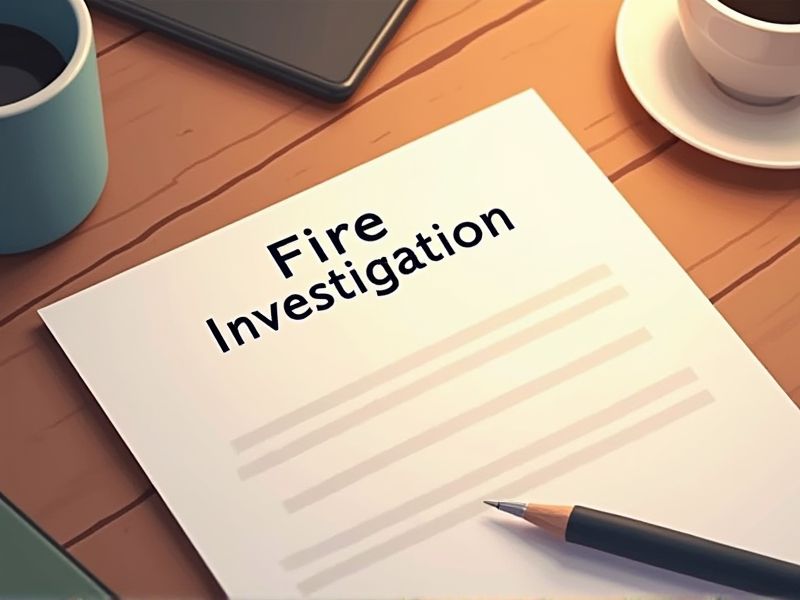
Fire investigators play a crucial role in determining the origins and causes of fires, which impacts both legal outcomes and fire safety strategies. Having specific certifications ensures that investigators possess the necessary knowledge and skills to analyze fire scenes accurately and objectively. Certifications provide credibility and uphold industry standards, facilitating collaboration with other agencies and stakeholders. Consider these important certifications you may need for becoming a fire investigator.
IAAI Certified Fire Investigator (CFI)
The IAAI Certified Fire Investigator (CFI) credential ensures that a fire investigator has met professional standards for expertise and experience, which often increases their credibility in court proceedings. With rapidly advancing fire science and evolving investigative techniques, this certification helps practitioners stay updated with the latest knowledge and methodologies. Attaining CFI status signifies a commitment to ethics and professionalism, essential in scenarios where accurate determinations can impact legal outcomes and insurance claims. Many agencies and employers prioritize or even require certified individuals, improving job prospects and career advancement opportunities in the fire investigation field.
NFPA Certified Fire Inspector I
The NFPA Certified Fire Inspector I credential provides foundational knowledge crucial for understanding fire prevention and code enforcement, which aids a Fire Investigator in assessing fire incidents accurately. This certification ensures the investigator is well-versed in identifying potential fire hazards and compliance issues, which directly supports determining the cause of fires. Fire Inspectors with this certification are trained to recognize standard investigative and reporting procedures, reducing errors and enhancing the reliability of fire investigation findings. Having this certification indicates a commitment to upholding industry standards, which builds trust with stakeholders, including public safety officials and insurance companies.
NFPA Certified Fire Inspector II
Having a NFPA Certified Fire Inspector II ensures a comprehensive understanding of advanced fire prevention techniques and code enforcement, which aids in accurately identifying fire causes. The certification provides an in-depth knowledge of fire inspection protocols, leading to more effective investigation and reporting. It also establishes a baseline proficiency in analyzing complex fire safety systems, crucial for reconstructing fire scenarios. Employers and agencies seek this certification as it enhances credibility and reliability in fire investigation tasks.
NICET Certification in Fire Alarm Systems
NICET Certification in Fire Alarm Systems is needed for a Fire Investigator to ensure they possess the technical knowledge necessary to analyze fire alarm systems accurately. It enhances the investigator's ability to assess whether alarm systems functioned correctly during an incident. Certified investigators gain credibility, leading to more reliable testimony in legal cases. The certification process covers a range of competencies crucial for identifying potential system failures or tampering.
ATF Arson Investigation Training
ATF Arson Investigation Training enhances a fire investigator's ability to accurately determine the cause and origin of fires, thus reducing wrongful arrests. This specialized training provides comprehensive knowledge on fire dynamics and accelerant detection, crucial for identifying intentional fires. Advanced techniques taught in the program improve evidence collection, leading to stronger legal cases. Equipping investigators with this training ultimately aids in preventing future arson incidents by correctly identifying patterns and sources.
Hazardous Materials Technician Certification
Hazardous Materials Technician Certification equips fire investigators with the skills to safely analyze and handle dangerous substances they may encounter at fire scenes. Understanding chemical behaviors and potential reactions enhances their ability to determine the fire's origin and cause accurately. Proper certification ensures investigators can protect themselves and the public during fire investigations involving hazardous materials. Compliance with regulatory standards requires such qualifications to ensure investigative integrity and safety.
NAFI Fire Investigation Certification
The NAFI Fire Investigation Certification is crucial because it standardizes the training and expertise required for effective fire investigations. Securing this certification demonstrates a fire investigator's proficiency and commitment to industry standards, which can enhance credibility and trust in legal proceedings. Employers and agencies often require such certification to ensure that investigators can accurately determine fire origins and causes. Holding this certification may lead to better job opportunities and professional growth within the fire investigation field.
Forensic Science Technician Certification
Forensic science technician certification equips fire investigators with standardized knowledge and skills, ensuring consistent and accurate analysis of fire scenes. Certification provides credibility, enhancing the trustworthiness of findings in legal proceedings. Training associated with certification keeps investigators updated on the latest techniques and technologies in fire investigation. Certified professionals often have better employment opportunities and career advancement due to proven competency and expertise.
Crime Scene Investigation (CSI) Certification
Crime Scene Investigation (CSI) Certification equips fire investigators with standardized skills essential for precise evidence collection and analysis. This certification ensures that investigators can accurately determine the cause and origin of fires, reducing the risk of oversight or error. Specialized training in CSI practices enhances the credibility of investigative findings in legal contexts. Employers and legal systems often mandate certification to maintain high standards in fire investigation practices.
Certified Forensic Interview Specialist
The role of a Certified Forensic Interview Specialist enhances a fire investigator's ability to accurately gather information from witnesses and suspects. Specialized training in forensic interviewing helps identify deceptive behaviors and elicit truthful responses. Effective communication and interviewing skills improve the overall quality and reliability of the investigation. Enhanced interview techniques aid in collecting comprehensive evidence, crucial for understanding the cause and origin of a fire.
Summary
By obtaining certifications, you can enhance your credibility as a fire investigator. This added credibility generally leads to more trust from clients and peers. With improved trust, you often gain access to more complex cases and opportunities. Expertise and capability typically broaden, increasing potential for career advancement.
